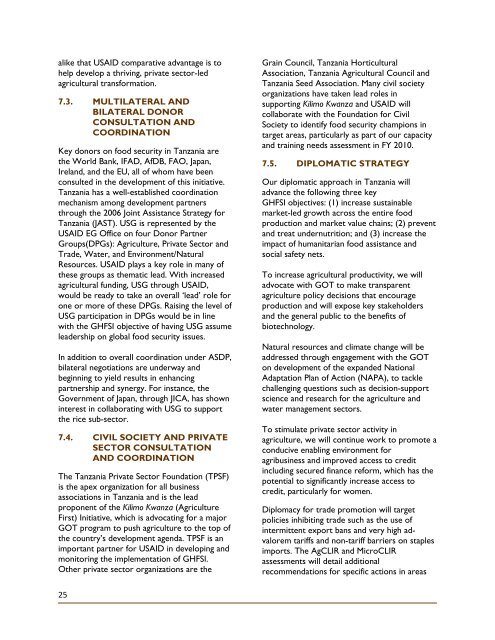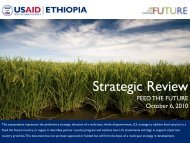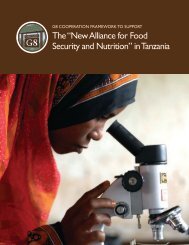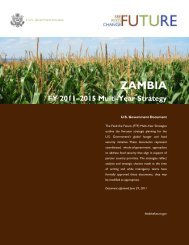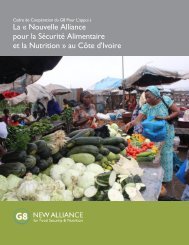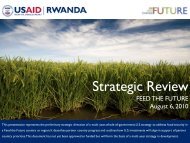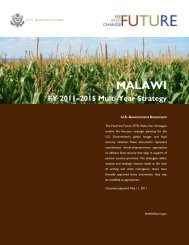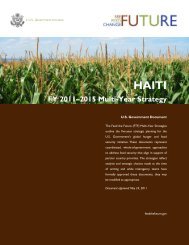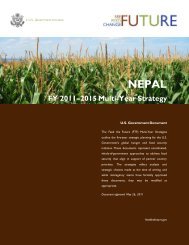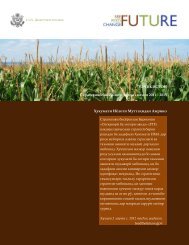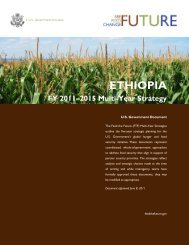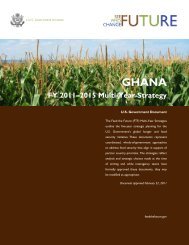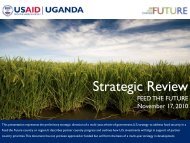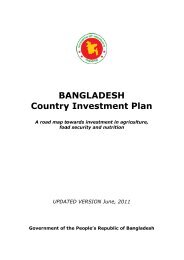Feed the Future FY 2010 Implementation Plan, Tanzania
Feed the Future FY 2010 Implementation Plan, Tanzania
Feed the Future FY 2010 Implementation Plan, Tanzania
- No tags were found...
Create successful ePaper yourself
Turn your PDF publications into a flip-book with our unique Google optimized e-Paper software.
alike that USAID comparative advantage is tohelp develop a thriving, private sector-ledagricultural transformation.7.3. MULTILATERAL ANDBILATERAL DONORCONSULTATION ANDCOORDINATIONKey donors on food security in <strong>Tanzania</strong> are<strong>the</strong> World Bank, IFAD, AfDB, FAO, Japan,Ireland, and <strong>the</strong> EU, all of whom have beenconsulted in <strong>the</strong> development of this initiative.<strong>Tanzania</strong> has a well-established coordinationmechanism among development partnersthrough <strong>the</strong> 2006 Joint Assistance Strategy for<strong>Tanzania</strong> (JAST). USG is represented by <strong>the</strong>USAID EG Office on four Donor PartnerGroups(DPGs): Agriculture, Private Sector andTrade, Water, and Environment/NaturalResources. USAID plays a key role in many of<strong>the</strong>se groups as <strong>the</strong>matic lead. With increasedagricultural funding, USG through USAID,would be ready to take an overall ‘lead’ role forone or more of <strong>the</strong>se DPGs. Raising <strong>the</strong> level ofUSG participation in DPGs would be in linewith <strong>the</strong> GHFSI objective of having USG assumeleadership on global food security issues.In addition to overall coordination under ASDP,bilateral negotiations are underway andbeginning to yield results in enhancingpartnership and synergy. For instance, <strong>the</strong>Government of Japan, through JICA, has showninterest in collaborating with USG to support<strong>the</strong> rice sub-sector.7.4. CIVIL SOCIETY AND PRIVATESECTOR CONSULTATIONAND COORDINATIONThe <strong>Tanzania</strong> Private Sector Foundation (TPSF)is <strong>the</strong> apex organization for all businessassociations in <strong>Tanzania</strong> and is <strong>the</strong> leadproponent of <strong>the</strong> Kilimo Kwanza (AgricultureFirst) Initiative, which is advocating for a majorGOT program to push agriculture to <strong>the</strong> top of<strong>the</strong> country’s development agenda. TPSF is animportant partner for USAID in developing andmonitoring <strong>the</strong> implementation of GHFSI.O<strong>the</strong>r private sector organizations are <strong>the</strong>Grain Council, <strong>Tanzania</strong> HorticulturalAssociation, <strong>Tanzania</strong> Agricultural Council and<strong>Tanzania</strong> Seed Association. Many civil societyorganizations have taken lead roles insupporting Kilimo Kwanza and USAID willcollaborate with <strong>the</strong> Foundation for CivilSociety to identify food security champions intarget areas, particularly as part of our capacityand training needs assessment in <strong>FY</strong> <strong>2010</strong>.7.5. DIPLOMATIC STRATEGYOur diplomatic approach in <strong>Tanzania</strong> willadvance <strong>the</strong> following three keyGHFSI objectives: (1) increase sustainablemarket-led growth across <strong>the</strong> entire foodproduction and market value chains; (2) preventand treat undernutrition; and (3) increase <strong>the</strong>impact of humanitarian food assistance andsocial safety nets.To increase agricultural productivity, we willadvocate with GOT to make transparentagriculture policy decisions that encourageproduction and will expose key stakeholdersand <strong>the</strong> general public to <strong>the</strong> benefits ofbiotechnology.Natural resources and climate change will beaddressed through engagement with <strong>the</strong> GOTon development of <strong>the</strong> expanded NationalAdaptation <strong>Plan</strong> of Action (NAPA), to tacklechallenging questions such as decision-supportscience and research for <strong>the</strong> agriculture andwater management sectors.To stimulate private sector activity inagriculture, we will continue work to promote aconducive enabling environment foragribusiness and improved access to creditincluding secured finance reform, which has <strong>the</strong>potential to significantly increase access tocredit, particularly for women.Diplomacy for trade promotion will targetpolicies inhibiting trade such as <strong>the</strong> use ofintermittent export bans and very high advaloremtariffs and non-tariff barriers on staplesimports. The AgCLIR and MicroCLIRassessments will detail additionalrecommendations for specific actions in areas25


